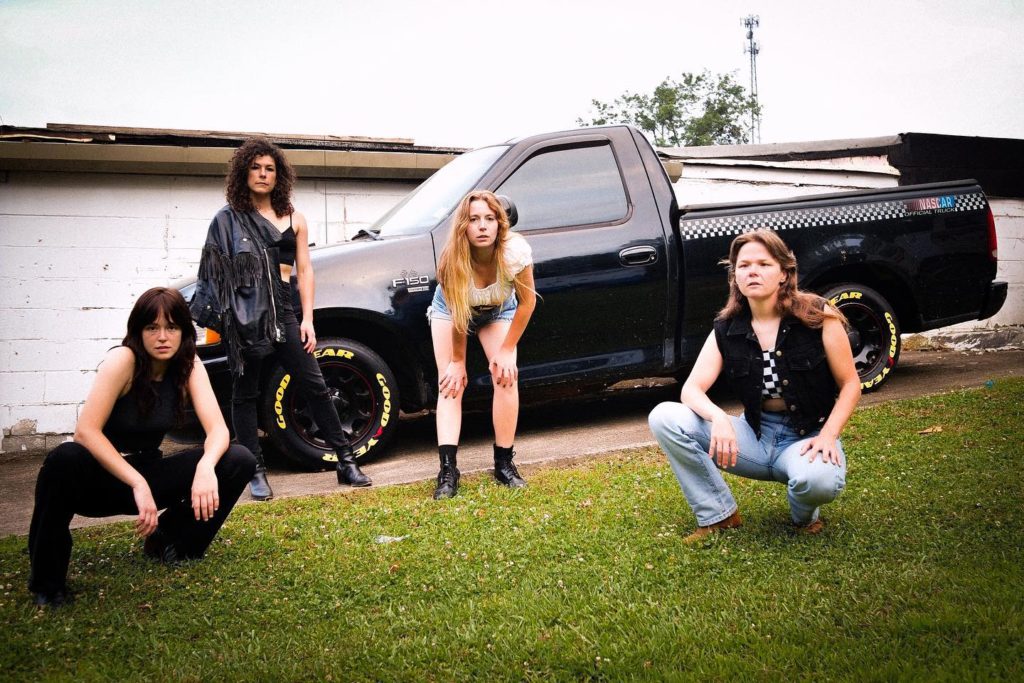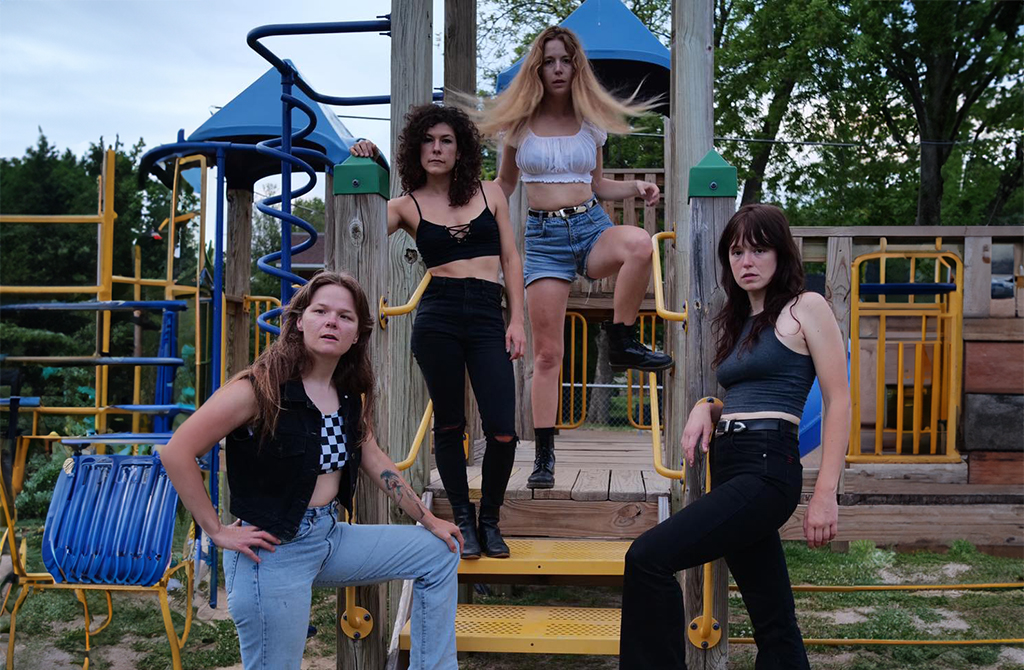Returning to Champaign-Urbana for PYGMALION is Thelma and the Sleaze — an all-woman, queer, independent southern rock band from Nashville, Tennessee. The group is the work of founder, lead vocalist, and guitar player Lauren “LG” Gilbert. Gilbert started out as a Midwestern girl from Kankakee, IL, but has made a home in her adopted city of Nashville where she moved to study audio engineering.
LG will front Thelma & the Sleaze at the Rose Bowl Tavern (inside) as the closing act on Friday, September 22nd at 12:15 a.m. as part of PYGMALION.
Smile Politely: You describe Thelma and the Sleaze as Southern Rock or Queer Southern Rock. What’s important about the South or Southernness in your sound?
LG: We live in the triangle [Nashville, Memphis, Muscle Shoals]. A great deal of the last century’s popular music has come out of it — lots of rock, R&B, blues, and country have been created in that triangle. We’re surrounded, influenced, and empowered by it as well as other things, but living there you can’t avoid being influenced by it.
I have to say: I’m not originally from the South. I was born in Kankakee, IL, lived in Kentucky for about six years as a kid, then moved back, then lived in Iowa before high school, and then 20 years in Nashville from when I was twenty-one. Everything that I loved about the music of the South was really contradictory — white dudes with their stupid flag and bigotry and Southern pride being influenced by the Black women who basically invented and innovated rock ’n’ roll. As a Midwestern Girl, I was really intrigued, more, affected by it. I found the contradiction itself interesting.
SP: What about the sound really draws you to it?
LG: Southern Rock is a disruptive tool. It lets me speak against people appropriating culture. There’s a harmony to it that both violent and weird — and fucked up — but also beautiful. It struck me and fascinated me and pissed me off. It made me want to impose myself on that [dominant, masculine] culture more in order to get people excited about women [in music] and remind people that Black women invented rock ’n’ roll. I’ve been doing this since 2013. I won’t pretend to have done a great job — there have been missteps and I acknowledge that — but I have been doing the best I can.

SP: Has the band always been queer?
LG: Yes. I found the Midwest pretty isolating as a young person, and I thank god — god being Tanya Tucker — that I was born gay because it gave me the fire in my belly to leave. Thelma and the Sleaze has always been openly queer and dyke-y and DIY, touring in an old Baptist church van. We never intended to be sexy, but even in a queer setting, my sexuality is sometimes polarizing. I choose to add some aggressive sexuality to songs and my stage presence, and sometimes people have adverse reactions. We are a sexy band, but that’s not the purpose of the group.
SP: How do you choose band members?
LG: I hire women, not all queer, [but] people who can play well. If they’re not queer and they can play well, then great. Thing is, the band promotes a gay agenda. I’m going to talk about fisting and eating pussy. If that makes you uncomfortable then maybe you shouldn’t be in the band. If you’re down, then you can hang. The bottom line is that we tour for 100 shows a year, and I’ve got to have band members who are professional and play well. I love straight bitches. I’ll play with them any day of the week. I hire women and women-identifying members who don’t cause drama, play well, and dress really good.
SP: How did your hiatus making guitar pedals for Earthquaker Devices change the band?
LG: Before that Thelma and the Sleaze was a three-piece band where the bassist and the drummer were dating. It’s documented pretty heavily in [the film] Kandyland, but we signed to a label with a creep manager who signed us up for a huge promotional event for an album where we did 31 shows in 29 spaces in the same city in about as many days. The bassist and the drummer broke up, and left me holding the fuse. We were about to break through the glass ceiling, but instead we imploded. My friend Julie invited me to come to Akron and make some pedals, just to work a steady job, and watch her house, and figure out my next move. It was really wild to have a “regular Joe job” where I had time to think and save money to get a van. I did some social media for them too, which meant that I got to practice making myself the focus of a project, which was uncomfortable at first because I like collaborative settings. I got to gather myself, heal, and get money to decide where to go next.
SP: And the band has always been that kind of DIY.
LG: Yes. We exist on resourcefulness and tenacity. We’re still a DIY band, and I pay my bandmates as much as I possibly can. We’ve been doing it longer than most people get to do it, and I want to do it with a good attitude. I think my real fans appreciate and understand it.
SP: Did being signed to a label ever appeal to you?
LG: I have no interest in playing ball in the current music industry; I think it’s a scam. Even bands that make it I would say didn’t. They’ve got a high-interest loan and fancy pictures. I’ve always been poor and always working hard. I make a decent living, live low-cost, and have carved out my own slice of happiness in my dream. The minute that I’m successful, the whole classic rock edifice would have to change… probably fall, actually. I don’t pander to the male gaze, and you’ll never see me on my knees on a stage, which probably wouldn’t do me any favors with a label either. It’s becoming harder and harder to have a DIY band at this level for this long. The costs are so high, the industry’s been gentrified, and it seems to have an attention span the length of a tampon commercial. And I just don’t want to be the artist that they’re signing. There are three ways to skip the line in the industry: look like a supermodel, have daddy’s money, or have so much talent that no one can deny you. Like Brittany Howard: there’s a Prince-level rock god. Her talent is impossible to ignore.
SP: What has inspired some of your recent work?
AG: Lots of different stuff. Our newest track, “Vulture Dog,” which came out on [our album] Holey Water on September 1st, deals with everything from the crisis at the US/Mexico border to problems with nationalism and world problems with migration and taking care of people instead of coming together as a global community, which we have to do. We should just give a fuck now instead of being forced to later. One specific problem that has stuck with me is the hypocrisy of children in cages, especially in a country where the right to choose to have children is so precarious.
SP: How do they come up in your sound choices for “Vulture Dog” (and Holey Water)?
LG: A lot of my melodies/riffs are pretty redundant, almost hypnotic. You can listen to the song and just hear what’s going on. “No More Tears” by Ozzy Osbourne had a lot of influence on that song. We can do dark subject matter and talk about things that are either morbid or considered dark, but do it in a way that listeners feel a drive and connection. It’s more inspiring action instead of a direct call to action; creating a sense of empowerment to make change.
I want people to hear these women, from everywhere, being free, being excellent, and being completely in their creative space and passion. I want hearing them to make you want to transfer that to whatever you want to do in your life: running a band, getting a degree, taking the girls to Vegas, organizing — whatever it is. Just start.
Thelma and the Sleaze with Kangaroo Court, Man on Man, and Chuck’s Papas at PYGMALION
Rose Bowl Tavern
Urbana
F September 22, 12:15 a.m.
$25








